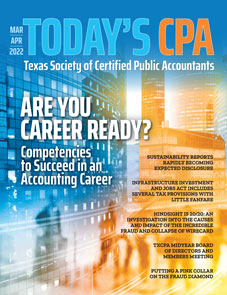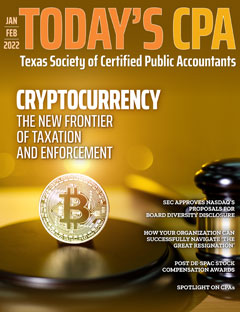Sustainability Reports Rapidly Becoming Expected Disclosure
By Don Carpenter, MSAcc/CPA
Knowledgeable investors are quite accustomed to the standard reporting cycle of public companies, culminating in the Annual Report (Form 10-K) followed closely thereafter by the Proxy Statement. These reports offer insight into the financial viability and corporate governance of organizations. Although not part of the Securities and Exchange Commission (SEC) disclosure regime, the Sustainability Report is taking its place in what is rapidly becoming a triumvirate of reports that guide investors in their portfolio allocation.
The Sustainability Report is also referred to as the ESG disclosure because material Environmental, Social and Governance matters are reported. As such issues as climate change, fair trade and income inequality have moved to the forefront of business issues, more and more fund managers and individual investors are taking these matters into consideration when making investment decisions. This is reflected in the growing number of companies issuing annual sustainability reports.
A recent survey by the Governance & Accountability Institute, Inc. found that 90% of the S&P 500 issued sustainability reports in 2019 compared to only 20% in 2011.
In 2020, the SEC Investor Advisory Committee weighed in with several conceptual recommendations that could be viewed as the first step to bringing this report under the auspices of the Commission. The committee’s review of sustainability reporting was grounded in its growing importance to investors. The committee pointed out that passivity with regard to these disclosures heightens the risk that either capital flows begin to favor overseas markets and/or U.S. markets fail to take the lead in shaping ESG reporting standards.
To counter these concerns, the committee made several recommendations.
Investors Require Reliable, Material ESG Information Upon Which to Base Investment and Voting Decisions: As companies vie for capital, inconsistent or inaccurate data hampers investment decisions. Currently, sustainability reporting tends to follow the guidelines outlined by three distinct reporting frameworks. The Global Reporting Initiative (GRI) first began publishing reporting standards in 1999 and maintains a warehouse of over 40,000 reports.
In 2017, the GRI began to move from a conceptual framework to reporting standards and over 51% of the S&P reporting companies utilize GRI guidelines. The Sustainability Accounting Standards Board (SASB) was organized by investors to function much like the Financial Accounting Standards Board (FASB) to bring a disciplined approach to sustainability reporting. SASB issues standards by industry that outline material topics and metrics to guide disclosure.
The third framework, Task Force on Climate-Related Financial Disclosures (TCFD), was organized by finance ministers and central bank governors to bring reliable and consistent disclosure to climate-related reporting. Currently, reporting companies are not required to adhere to any individual framework. However, a majority of S&P reporting companies utilize the GRI standards and 25% utilize or mention the SASB standards. Reporting entities are not necessarily relying exclusively upon one framework so duplication does occur.
Issuers Should Directly Provide Material Information to the Market Relating to ESG Issues Used by Investors to Make Investment and Voting Decisions: Because ESG reporting is not required, investors often rely upon third party sources to fill in gaps in available information. For example, 65% of S&P companies respond to the Carbon Disclosure Project questionnaire that scores and ranks respondents with regard to climate issues such as carbon emissions, water, waste and supply chain. However, the SEC notes that investors prefer and place greater reliance on direct disclosures by organizations.
To meet this demand, it is critical that companies report material information in a format consistent across an industrial sector since investors are using the information to allocate capital. The chairman of the International Accounting Standards Board (IASB) has asserted that many sustainability reports “greenwash” the data to put themselves in the best possible light.
To bring credibility to the process, many reporting entities have begun to rely on third party reviews for external assurance. Surprisingly, engineering firms were the most common third-party reviewer providing assurance on greenhouse gas reporting. But accounting firms and other third-party consultants have also weighed in on sections of ESG reports.
One reporting entity has even provided an examination report from its auditor stating that no material errors were found in the data.
To date, only a very small number of reporting organizations have included the Sustainability Report with their 10-K even though other unaudited information such as MD&A are regularly included. And the SEC notes that concern over forward looking information should not hinder full disclosure since such information is also common in MD&A. Some registrants do file their Sustainability Report with the SEC as an 8-K Item 7.01 item under Regulation FD.
Finally, the SEC Notes That Requiring Material ESG Disclosure Will Level the Playing Field Between Issuers: Currently, small and mid-sized registrants are at a disadvantage with regard to disclosure due to resource constraints. Without the required reporting systems and necessary staff, these firms are not able to match the information provided by larger competitors. The SEC states that by standardizing the type of information and materiality of such data, the playing field could be made more level for all filers when competing for capital.
As the emphasis on factors beyond financial performance become more critical to investors and the financial sector as a whole, companies would be well served to take a fresh look at sustainability reporting and keep abreast of developing trends.
About the Author: Don Carpenter is clinical professor of accounting at Baylor University. Contact him at Don_Carpenter@baylor.edu.


